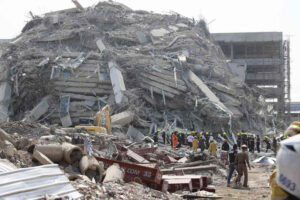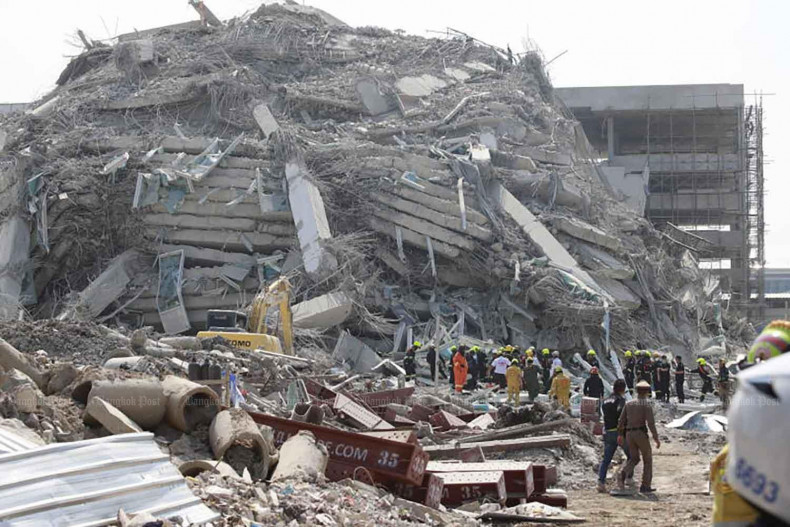
7.7 earthquake, Thailand unprepared for disasters
Bangkok Post Editorial
Rescue personnel walk past the rubble of the under-construction government building that collapsed in Chatuchak district of Bangkok on Friday. Dozens of workers remained trapped as of Friday afternoon.
The effects of the earthquake felt throughout the country and Bangkok yesterday afternoon remind us that Thailand does not have measures or a response to deal with severe natural disasters.
Although the country does not stand on an active fault or the Ring of Fire, it has experienced small tremors, such as a quake in 2012, and the Boxing Day tsunami over two decades ago.
These experiences, however, did not push the country to prepare better or establish effective warning systems.
What happened on Friday caused a collective panic, with people seen running from buildings. Panic turned into fear after it was confirmed that an under-construction high-rise of a State Audit office building in Chatuchak district collapsed like a falling house of cards. Eighty workers are believed to be left under the debris.
The reaction from the government and responsible agencies lacked urgency and coordination. For one hour, the public was left clueless about what happened and had to rely on information sourced from social media.
The Department of Meteorology, which is responsible for issuing warnings, could not launch its live broadcast in real time because of an internet signal problem.
Amid it all, the so-called “cell broadcast service (CBS) system”, which allows emergency weather and natural disaster warnings to be disseminated via mobile phone messages, is not yet active. Since the 2004 Boxing Day tsunami, almost every government has promised to launch a CBS to warn the public.
The National Broadcasting and Telecommunications Commission (NBTC), which is responsible for the CBS system, has said it is on trial and will be fully active later this year.
One hour after the quake, the National Disaster Prevention and Mitigation Committee (NDPMC) held a press conference, with Prime Minister Paetongtarn Shinawatra urging people not to panic or use elevators.
Because earthquake response is not part of Thai culture, some people are clueless about what a safe site is and what they should do and avoid.
Meanwhile, the quake has raised concerns about building safety.
The collapse of the under-construction State Audit Office Building has raised concerns about how the public project, built with tax money, was so vulnerable and easily destroyed.
The state auditor and official engineers must inspect the site to understand how the collapse occurred at the site where, two years ago, a construction crane also fell, killing one construction worker.
Now, it needs to be considered how many buildings in Bangkok have been designed and built with earthquake-resistant features. Many buildings in Bangkok built before the nation’s building codes were revised in 2007 were not designed and built with quake-resistant features.
Amid lax enforcement, the question of how many recently built buildings are quake-proof and safe remains. After the dust settles, the Interior Ministries and local governments, such as the Bangkok Metropolitan Administration (BMA), must provide answers.
Most importantly, the government must do more to educate and prepare the public about the risks of natural disasters and evacuation. Our response to natural disasters will remain unacceptable without preparation and proper warning systems. This needs to be addressed.
Editorial
Bangkok Post editorial column
These editorials represent Bangkok Post thoughts about current issues and situations.
Email : anchaleek@bangkokpost.co.th
Source: https://www.bangkokpost.com/opinion/opinion/2990242/unprepared-for-disasters


